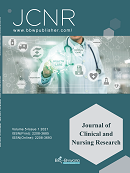Abstract
Objective: To investigate the cognition degree of male nursing students to HPV and nine-valent vaccine and the influencing factors of male willingness to receive nine-valent HPV vaccine. Methods: Qualitative research semi-structured interview was conducted on male nursing students, and phenomenological research method was used to record, ran scribe, encode and classify the interview data and extract the topic. The number of interviews was determined according to the information saturation. Results: Seven themes were summarized in this study, which were mainly divided into two aspects. The promotion of vaccination includes two aspects: self-benefit and benefit of others. The prevention of vaccination mainly includes low awareness rate, feminization of vaccine information, high cost and safety and effectiveness. Conclusion: Male nursing students have low cognition degree and inoculation intention to human papillomavirus and nine-valent vaccine, so it is necessary to further strengthen publicity and carry out college education to improve vaccination.
References
Iorga L, Dragos MR, Cristina DC, et al., 2020, Penile Carcinoma and HPV Infection (Review). Exp Ther Med. 20(1): 91-96.
Wang R, Pan W, Jin L, et al., 2020, Human Papillomavirus Vaccine against Cervical Cancer: Opportunity and Challenge. Cancer Lett. 28(471):88-102.
Canfell K, Kim JJ, Brisson M, et al., 2020, Mortality Impact of Achieving WHO Cervical Cancer Elimination Targets: A Comparative Modelling Analysis in 78 Low-Income and Lower-Middle-Income Countries. Lancet. 22;395(10224):591-603.
Skinner SR, Davies C, Cooper S, et al., 2015, HPV Edu Study Protocol:A Cluster Randomised Controlled Evaluation of Education, Decisional Support and Logistical Strategies in School-based Human Papillomavirus Vaccination (HPV) of Adolescents. BMC Public Health. 15(15): 896.
Li P, Li Z, Qin Q, et al., 2017, Exploration and Practice of Training Mode for Male Nursing Students. General Nursing, 15(24): 3052-3054.
Chen X, 2000, Qualitative Research Methods and Social Science Research. Beijing: Educational Science Press, 277-307.
Liu M, 2008, Study on Nursing Quality. Beijing: People’s Health Publishing House, 39-74.
Smalley RC, Roller N, Pellom ST, et al., 2020, Therapeutic Vaccines for HPV-Associated Malignancies. Immunotargets Ther. 9:167-200.
Li Y, 2017, Relationship between Human Papillomavirus Infection and Male Reproductive Health. Chinese Journal of Andrology, 23(04): 376-380.
Zulibiyan I, 2018, Investigation on the Awareness of some Female College Students about Cervical Cancer and HPV in Urumqi, Xinjiang. Urumqi: Xinjiang Medical University.
Pang Z, Chen X, Xiang Y, 2016, Investigation and Analysis on Influencing Factors of Female College Students’ Cognition and Vaccination Intention of Human Papillomavirus Vaccine in Guangzhou University City. Research and Practice of Health Medicine, 13 (02): 22-24.
Wu Q, Xu Y, Zhang J, et al., 2018, Human Papillomavirus Awareness and Vaccination Intention of Female Medical Students in Guangzhou. China School Health, 39(11): 1699-1701.
Ouyang L, Wang S, et al., 2020, Investigation on Female Medical Students’ Cognition and Vaccination Willingness of HPV and its Vaccine in Jianghan University. Journal of Jianghan University (Natural Science Edition), 48(05): 47-54.
Zeng X, Ren Z, Wei X, et al., 2015, Investigation on the Cognition of HPV and Vaccine among Undergraduates of Sun Yat Een University. Modern Preventive Medicine, 42 (10): 1822-1825.
Zhang J, Han Y, Wang R, et al., 2020, Investigation on Knowledge, Belief and Practice of Human Papillomavirus and HPV Vaccine in Different Populations. China Health Education, 36 (02): 147-152.
